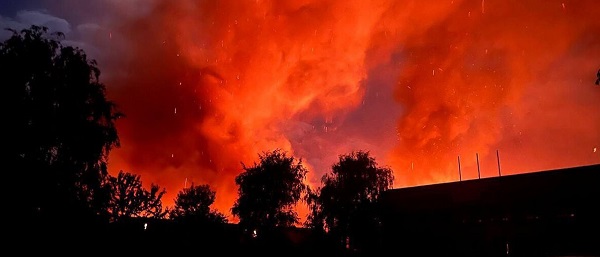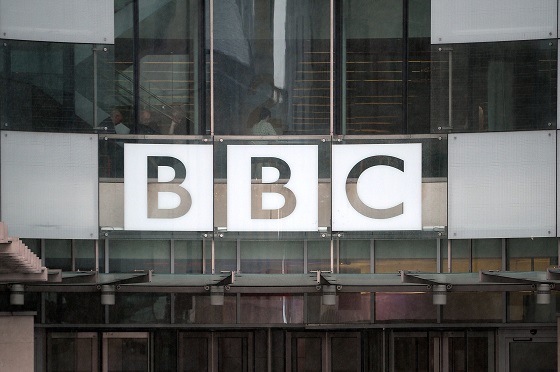conflict
“Evacuate”: Netanyahu Warns Tehran as Israel Expands Strikes on Iran’s Military Command

 Sam Cooper
Sam Cooper
As President Donald J. Trump opened meetings with Western leaders at the G7 summit in Alberta early Monday, multiple reports signaled a dramatic escalation in Israel’s military campaign against Iran—a broader and potentially more lethal phase of the conflict. In a televised address, Prime Minister Benjamin Netanyahu urged citizens of Tehran to “evacuate,” confirming Israeli aircraft were operating deep inside Iranian airspace. Meanwhile, as U.S. military assets approach the Middle East by sea and air, Trump issued a stark warning to Iran’s leadership, cautioning against any retaliation targeting U.S. military assets in the region.
“We are telling the citizens of Tehran: evacuate,” Netanyahu reportedly declared from a secure facility beneath Tel Aviv. “We are taking action to eliminate the existential threat posed by Iran’s nuclear and ballistic missile program.”
Trump, speaking from Calgary hours before his closed-door G7 meetings, warned that any attack on U.S. military personnel or facilities “would be met with overwhelming force,” according to statements confirmed by Reuters.
The warnings accompanied a new wave of Israeli airstrikes early Monday targeting underground missile facilities, command bunkers, and air defense batteries across central Iran. Reuters, citing Israeli military officials, confirmed that dozens of warplanes were involved in the overnight operation, striking missile storage sites near Qom and key military complexes southwest of Tehran.
Israel also said it had struck the Tehran command center of Iran’s elite Quds Force, in what The New York Times and Reuters described as a major escalation in the deadliest confrontation between the two countries to date. Analysts note the Quds Force plays a central role in organizing the Iranian regime’s network of regional proxy militias.
Now in its fourth day, the conflict has claimed at least 224 lives in Iran and more than 20 in Israel, with thousands wounded. Israeli officials said eight people were killed in Monday’s strikes alone.
Iran’s Health Ministry reported more than 1,400 wounded, while Israeli authorities said some 600 have been injured since hostilities began.
Meanwhile, President Trump reportedly rejected an Israeli plan to assassinate Iran’s Supreme Leader Ayatollah Ali Khamenei, three U.S. officials told CBS according to BBC, in a report published Sunday. Trump reportedly told Netanyahu the plan was “not a good idea,” and the conversation is said to have taken place after Israel launched its first strike on Friday.
Unverified reports on Monday suggested that Iranian leaders may be seeking a diplomatic exit from the conflict by pledging to halt nuclear enrichment—but are also searching for a face-saving mechanism that would allow them to preserve regime legitimacy. These claims have not been confirmed by U.S. or Israeli intelligence but are circulating among regional analysts.
BBC News, citing regional correspondents and satellite imagery, reported sustained Israeli bombardments along a corridor stretching from Esfahan to the outskirts of Tehran. Footage broadcast by Iran’s semi-official Fars News Agency showed thick plumes of black smoke rising from industrial zones in Kermanshah and explosions near known missile research installations long suspected by Western governments of contributing to Iran’s nuclear infrastructure.
Iranian authorities, while acknowledging the scale of the attacks, have characterized them as “limited,” claiming that their air defense systems intercepted many incoming missiles.
According to the Wall Street Journal, U.S. early warning systems detected a flurry of retaliatory missile activity inside western Iran shortly after the Israeli strikes began. However, no launches were confirmed—fueling speculation that Iran’s top leadership is seeking to avoid a direct confrontation with the United States or Israel at this stage.
Still, the risks of an expanding war remain acute. U.S. Central Command has confirmed that naval and air assets—including carrier strike groups and long-range bombers—have been repositioned to heightened readiness levels across the Persian Gulf and Eastern Mediterranean.
The Bureau is a reader-supported publication.
To receive new posts and support my work, consider becoming a free or paid subscriber.
Invite your friends and earn rewards
Artificial Intelligence
AI Drone ‘Swarms’ Unleashed On Ukraine Battlefields, Marking New Era Of Warfare


From the Daily Caller News Foundation
Artificial intelligence-powered drones are making their first appearances on the battlefield in the Russia-Ukraine war as warfare creeps closer to full automation.
In bombardments on Russian targets in the past year, Ukrainian drones acting in concert were able to independently determine where to strike without human input.
It’s the first battlefield use of AI “swarm” technology in a real-world environment, a senior Ukrainian official and Swarmer, the company who makes the software, told the Wall Street Journal in a Tuesday report. While drones have increasingly defined modern battlefields, swarms until now had been confined to testing rather than combat.
“You set the target and the drones do the rest,” Swarmer Chief Executive Serhii Kupriienko told the WSJ. “They work together, they adapt.”
So far, the Swarmer technology has been used hundreds of times to target Russia assets, but was first used a year ago to lay mines on the front, the Ukrainian official told the WSJ. The software has been tested with up to 25 drones at once, but is usually utilized with only three.
Kupriienko told the WSJ that he was preparing to test up to 100 drones at once with the linking software.
A common arrangement used on the battlefield includes one reconnaissance drone to scout out the target and two explosive drones delivering the payload on target, the official told the WSJ.
While Western nations such as the U.S., France and the United Kingdom are also pursuing drone swarm technology, they have not deployed swarm technology on the battlefield the way Ukraine has, according to the WSJ. Currently, autonomous weapons are not regulated by any international authority or binding agreement, but ethical concerns around the technology has led many to call for increased regulation of weapons like the Swarmer system.
The Ukrainian Ministry of Foreign Affairs did not immediately respond to the Daily Caller News Foundation’s request for comment.
conflict
Trump Pentagon Reportedly Blocking Ukraine From Firing Western Missiles Deep Into Russia


From the Daily Caller News Foundation
The Department of Defense has spent months blocking the Ukrainian military from using American and British-made missiles to hit targets deep inside Russia, The Wall Street Journal reported Sunday, citing unnamed U.S. officials.
Undersecretary of Defense for Policy Eldridge Colby reportedly designed the procedure to review requests to carry out the long-range strikes with weapons that are either of U.S. origin or that require American intelligence or use components provided by the U.S., according to the WSJ. Secretary of Defense Pete Hegseth reportedly has the final say on whether Ukrainian forces can use the MGM-140 ATACMS (Army Tactical Missile System) to hit targets in Russia.
The reported blocks on missile strikes coincides with a Trump administration effort to broker a peace deal between Russia and Ukraine. A Pentagon spokesperson declined to comment further on the matter.
BREAKING: President Vladimir Putin reacts to B-2 Flyover pic.twitter.com/1mzVn7DxlW
— Jack Poso 🇺🇸 (@JackPosobiec) August 15, 2025
The Biden administration allowed Ukraine to carry out strikes with ATACMS in November, weeks after President Donald Trump won the 2024 election, the New York Times reported. Trump criticized the move during a December interview with Time magazine.
“It’s crazy what’s taking place. It’s crazy,” Trump said. “I disagree very vehemently with sending missiles hundreds of miles into Russia. Why are we doing that? We’re just escalating this war and making it worse. That should not have been allowed to be done.”
Trump and Russian President Vladimir Putin met in Alaska on Aug. 15 for a summit meeting during which Trump sought to secure a cease-fire in Russia’s war with Ukraine. As Trump greeted Putin, a B-2A Spirit stealth bomber and several fighters carried out a flyover of Elmendorf Air Force Base.
Trump met with Ukrainian President Volodymyr Zelensky and major European leaders on Aug. 18 to update them on the summit.
In July, Trump reached an agreement with NATO where members of the alliance would purchase weapons, including MIM-104 Patriot surface-to-air missiles, and donate them to Ukraine.
-

 Business1 day ago
Business1 day agoCBC cashes in on Carney as the news industry playing field tilts further in its favour, crippling the competition
-

 Agriculture20 hours ago
Agriculture20 hours agoFarmers Take The Hit While Biofuel Companies Cash In
-

 Daily Caller13 hours ago
Daily Caller13 hours agoMcKinsey outlook for 2025 sharply adjusts prior projections, predicting fossil fuels will dominate well after 2050
-

 Business4 hours ago
Business4 hours agoCarney’s Floor-Crossing Campaign. A Media-Staged Bid for Majority Rule That Erodes Democracy While Beijing Hovers
-

 Agriculture1 day ago
Agriculture1 day agoWas The Ostrich “Cull” A Criminal Act?
-

 International14 hours ago
International14 hours agoBBC boss quits amid scandal over edited Trump footage
-

 Agriculture1 day ago
Agriculture1 day agoThe Canadian Food Inspection Agency’s Bloodlust for Ostriches: Part 2
-

 Business13 hours ago
Business13 hours agoTrump: Americans to receive $2,000 each from tariff revenue




